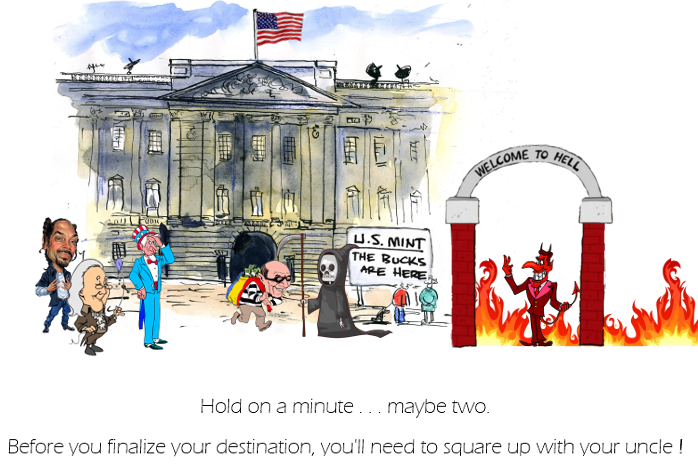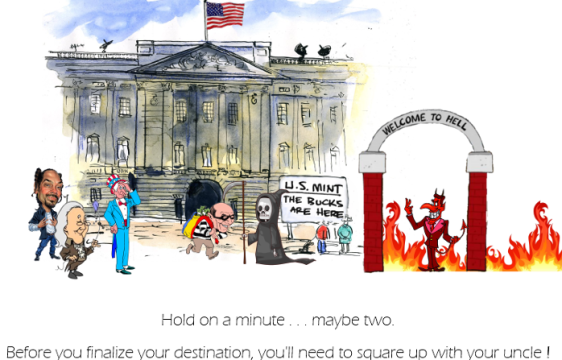
Benjamin Franklin once wrote, “[i]n the world nothing can be said to be certain except death and taxes.” Franklin’s point being that much like Snoop Dogg in the 90’s, before his unnecessary detours under other monikers, the Government gets its money. It’s got its “mind on [its] money and [its] money on [its] mind.” Snoop Doggy Dogg, Gin and Juice (Death Row Records 1993). So, while you may say “until death do us part” in your wedding vows, not even the Grim Reaper can get you out of paying the Government if you owe it.
This was the point in the recent decision U.S. ex rel. Robinson-Hill v. Nurses’ Registry and Home Health Corp., 2015 WL 3403054 (E.D. Ky. May 27, 2015). In Robinson-Hill, two whistleblowers filed a False Claim Act[1] (“FCA”) complaint against Nurses’ Registry, a Kentucky corporation that provides home health care services. Lennie House, the then-President, Chief Executive Officer, and sole owner of Nurses’ Registry and his wife, Vicki House, the secretary of Nurses’ Registry, were also named as defendants. The allegations of fraud against the defendants consisted of upcoding the severity of patients’ medical conditions, as well as the length of time and amount of times patients needed treatments, to fraudulently inflate bills to Medicare. The Government, subsequently after investigating, “intervened,” taking over the prosecution of the case.
During the pendency of the case, Mr. House died. The Government sought to substitute Mr. House’s estate in his stead as a defendant. Defendant Nurses’ Registry and Mr. House’s estate opposed the estate’s substitution, “arguing that all of the claims asserted against Mr. House abate[d] with his death.” Id. at *1. This was using what essentially could be described as a “reverse Harold Angel/Johnny Favorite from Angel Heart”[2] defense for Mr. House’s prior, alleged sins.
The court, while finding that the FCA was silent on whether death abated a claim, held that the appropriately-titled 28 U.S.C. § 2404, Death of defendant in damage action, applied. 28 U.S.C. §2404 states: “[a] civil action for damages commenced by or on behalf of the United States . . . shall not abate on the death of a defendant but shall survive and be enforceable against his estate as well as against surviving defendants.” Despite such apparently-clear, statutory text, the question before the Court, nonetheless, was “whether the FCA claims asserted against Mr. House [we]re remedial or punitive in nature.” U.S. ex rel. Robinson-Hill, 2015 WL 3403054 at *1. If remedial, then 28 U.S.C. §2404 applied, and the estate would be substituted. Id.
In ruling, the Court noted that “[a] remedial action is one that compensates an individual for specific harm suffered, while a penal action imposes damages upon the defendant for a general wrong to the public.” Id. at *2. In finding the FCA “remedial,” such that 28 U.S. §2404 applied, the Court noted a “highlight [of] the remedial nature of the FCA [was that r]ecovery under the FCA does not run to the general public. Instead, the recovery runs to the United States and to the qui tam relators as compensation for damages.” Id. Therefore, the FCA is remedial, and the estate was substituted.
The take away point here is that, much like Louis Cyphre in Angel Heart, who was simply trying collect upon the personal debt owed to him by Johnnie Favorite (Johnnie’s soul), not even death will allow you to cheat the Government on what it’s owed.
If you have any questions about the False Claims Act or Medicare fraud, please contact me at bmarkovitz@jgllaw.com or 240-553-1207.
[1] If you are unfamiliar with the False Claims Act, for an explanation of the law, see my prior post, How Abraham Lincoln and Outside-the-Box Thinking Can Help Unions Stop Government Contractor Wage Theft
[2] Spoiler alert. For those who do not know, in Angel Heart, the protagonist learns that he previously killed another man in a voodoo ritual, taking over that man’s life, in an attempt to trick the devil from finding him to collect his soul.
